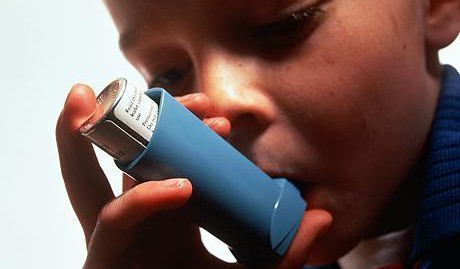
Being exposed to adverse experiences in childhood — such as witnessing domestic violence or drug abuse — could significantly increase the risk of developing asthma, according to a new study published in the Annals of Allergy, Asthma and Immunology.
Around 7.1 million children in the United States have asthma, making it one of the most common chronic illnesses in childhood. It’s also the third leading cause of hospitalization among children aged 15 and under and one of the leading causes of school absences, accounting for an estimated 14.4 million lost school days in 2008. While exposure to certain environmental factors — such as cigarette smoke or other air pollution — as well as having a history of early airway infections and certain inherited characteristics are believed to contribute to asthma development during childhood, the underlying causes of the condition remain unclear.
In recent years, researchers have become increasingly interested in understanding how stress may contribute to the development of asthma in children. Studies suggest that exposure to stress during fetal and infant development can increase the risk of asthma through immune and inflammatory responses, acting through the hypothalamic-pituitary axis (the body’s central “stress response” system).
Based on this line of evidence, researchers have formulated the “fetal programming of asthma hypothesis“, which postulates that the effects of prenatal exposure to stress may lead to vulnerabilities of the immune system that increase susceptibility to asthma and other allergenic conditions such as eczema (atopic dermatitis) and allergic rhinitis (hay fever). Studies have shown that exposure to stress during fetal development is associated with increased vulnerability to environmental asthma triggers, such as secondhand smoke exposure, and it may also interact with genetic factors to further increase the risk of developing asthma.
However, much less research has focused on the role of exposure to stress past infancy as a risk factor for asthma. For this latest study, lead investigator Dr. Robyn D. Wing and colleagues set out to determine whether adverse childhood experiences — often referred to as a “toxic stressor” — were associated with asthma risk.
The team analyzed data from the National Survey of Children’s Health, involving more than 92,000 children aged 17 years or under and. As part of the survey, parents were asked how often their child had been exposed to any adverse experiences – including witnessing a family member engaging in drug or alcohol abuse, domestic violence at home, parental separation, living with someone who had been in prison, a family death or living with someone who is mentally ill. They were also asked about their child’s exposure to tobacco smoke, whether the family felt safe in their neighborhood and whether their child had been diagnosed with asthma.
Overall, 17 percent of children in the study had been exposed to at least one adverse childhood experience, while 3.8 percent had been exposed to three adverse experiences and 0.93 percent had been exposed to at least five. The most common adverse experience reported by the children was living with a parent or caregiver who had divorced or separated.
Link between adverse experiences and asthma risk strongest among Hispanic children
The results revealed that children who had been exposed to one adverse childhood experience were 28 percent more likely to develop asthma than children who had not had any adverse experiences. The risk of asthma increased with greater exposure to adverse experiences: only 12 percent of children who had no adverse experiences were diagnosed with asthma, compared with 25 percent of those who had five or more. “The data showed that the more adverse childhood experiences a child is exposed to, the greater the probability he or she will develop asthma,” adds Dr. Wing.
Interestingly, the results were moderated by Hispanic ethnicity, meaning that the relationship between adverse childhood experiences and asthma was much stronger in Hispanic children. Indeed, exposure to four or more adverse experiences was associated with a nearly fivefold increase in lifetime risk of asthma among Hispanic children, while White children with four or more adverse experiences did not have any increased risk of asthma.
That finding is key, as it may help to explain, at least in part, the pervasive racial and ethnic disparities that are found in childhood asthma rates. In the U.S., the prevalence of asthma is highest among Hispanic — particularly Puerto Rican — and African American children, who are about twice as likely as white children to have asthma. African American and Hispanic children are also more likely to have uncontrolled asthma, and to be hospitalized for asthma-related complications. The new results suggest that these disparities may be partially attributable to pre-existing vulnerabilities, likely beginning during fetal development. This is in line with previous research showing that minority women have more severe physiological reactions to stressful experiences — including racism — during pregnancy, and that these exposures have negative consequences for fetal and child development.
Based on their findings, the researchers recommend that pediatricians and other child healthcare providers should consider the role of adverse childhood experiences as a potential risk factor for the development of asthma, particularly among minority children. It is also important that parents are aware that exposure to prolonged or severe psychosocial stressors can heighten vulnerability to environmental triggers like cigarette smoke and mold, and that limiting exposure to these triggers is critical for their child’s health, said Dr. James Sublett, president of the American College of Allergy, Asthma and Immunology.
“It is even more important that these high-risk children are identified and cared for by experts in the management of asthma,” added Dr. Sublett. He pointed out that identifying these children could also have implications beyond asthma, as stress-related vulnerabilities beginning during prenatal development have also been linked with a higher risk of a range of other chronic conditions including cardiovascular disease, obesity, kidney disease, and diabetes.
